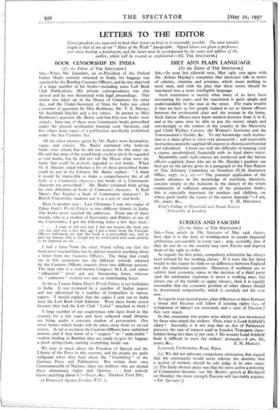LETTERS TO THE EDITOR
[Correspondents are requested to keep their letters as brief as is reasonably possible. The most suitable length is that of one of our " News of the Week" paragraphs. Signed letters are given a preference over those bearing a pseudonym, and the latter must be accompanied by the name and address of the author, which will be treated as confidential.—Ed. THE SPECTATOR.]
Sta,—When Mr. junanker, an ex-President of the Oxford Indian Majlis recently returned to India, his baggage was searched by the Bombay Customs Officers, and he was deprived of a large number of his books—including some Left Book Club Publications. His private correspondence was also opened and .he was threatened with legal proceedings. This matter was taken up in the House of Commons the other day, and the Under-Secretary of State for India was asked a number of questions by Miss Rathbone, Mr. T. E. Harvey, Sir Archibald Sinclair and a few others. In answer to Miss Rathbone's question Mr. Butler said that fifty-two books were seized ; forty-one of these were Communist books proscribed under the general notification banning such literature, and five others were copies of a publication specifically prohibited under the Sea Customs Act.
All the other answers given by Mr. Butler were incomplete, vague, and evasive. Mr. Butler explained why forty-six books were seized, but he did not account for the other six.
He said that none of the seized books could properly be regarded as text books, but he did not tell the House what were the
books that could be properly regarded as text books. When Sir A. Sinclair asked whether a list of these proscribed books could be put in the Library, Mr. Butler replied : " I think it would be impossible to make a comprehensive list of all books of a Communist character, but books of a Communist
character are proscribed." Mr. Butler refrained from giving his own definition of books of Communist character. Is Karl Marx's Das Kapital a book of Communist character ? In British Universities students use it as a sort of text book.
Here is another case : Last Christmas I sent two copies of Palme Dutt's World Politics to two different friends in India.
The books never reached the addresses. From one of these friends, who is a student of Economics and Politics at one of the Universities, I got the following letter a few days back :
" . . . I want to tell you that I did not receive the book you sent me, and only a few days ago I got a letter from the Customs Officers informing me that the book is a proscribed one, and to give my reasons why it should not be confiscated and some penalty . to be imposed on me . . .
I had a letter 'from the other friend telling me that the book never reached him, but he did not mention anything about a letter from the Customs Officers. The thing that struck
me in this connexion was the different attitude adopted by the Customs Officers towards these two different persons. The man who is a well-known Congress M.L.A. and rather " influential " never got any threatening letter, whereas the " unknown " student was sent an intimidating letter.
As far as I know Palme Dun's World Politics is not forbidden in India. It was reviewed by a number of Indian papers and was advertised by a number of booksellers in various papers. I should explain that the copies I sent out to India were the Left Book Club Editions. Were these books seized because they had the Left Club " Label " attached to theni ?
A large number of my countrymen who have lived in this country for a few years and have collected small libraries are living under a constant shadow of persecution. One never knows which books will be taken away from us on our return. As far as we know the Customs Officers have unlimited powers, and if they know of a " suspect " or " undesirable " student landing in Bombay they are ready to give his luggage a good spring-clean, turning everything inside out.
We hear so much about the Freedom of Speech and the Liberty of the Press in this country, and the people are quite indignant when they hear about the " Goebbling " of the German Press and PUblications. But within their own Commonwealth of Nations, there are millions who are denied
Brunrxick Square, London, W. C. r.














































 Previous page
Previous page